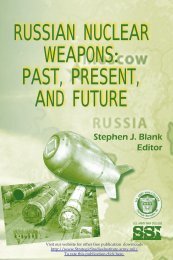The United States and China in Power Transition - Strategic Studies ...
The United States and China in Power Transition - Strategic Studies ...
The United States and China in Power Transition - Strategic Studies ...
Create successful ePaper yourself
Turn your PDF publications into a flip-book with our unique Google optimized e-Paper software.
of radical reformers under the leadership of Kang<br />
Youwei (康有为) <strong>and</strong> Liang Qichao (梁启超) came to<br />
advocate political change <strong>in</strong> <strong>Ch<strong>in</strong>a</strong>. <strong>The</strong>y argued that<br />
learn<strong>in</strong>g from the West must <strong>in</strong>clude the Western fundamentals,<br />
not just the practical matters; if <strong>Ch<strong>in</strong>a</strong> were<br />
to modernize <strong>and</strong> become powerful, it must adopt the<br />
Western way of government, bus<strong>in</strong>ess, military affairs,<br />
education, <strong>and</strong> so on; <strong>and</strong> make revolutionary<br />
changes <strong>in</strong> <strong>Ch<strong>in</strong>a</strong> accord<strong>in</strong>gly. <strong>The</strong>se changes would<br />
preferably turn <strong>Ch<strong>in</strong>a</strong> <strong>in</strong>to a constitutional monarchy.<br />
<strong>The</strong>y highly regarded Japan as an example but claimed<br />
that <strong>Ch<strong>in</strong>a</strong> could do better with the radical reforms.<br />
Those radical calls eventually reached the Q<strong>in</strong>g<br />
rulers. Emperor Guangxu (光绪皇帝) was persuaded<br />
by the radical reformers’ arguments <strong>and</strong> put Kang<br />
Youwei <strong>in</strong> charge of the reform movement. On June<br />
11, 1898, with Kang’s recommendations, the emperor<br />
issued his imperial edict (定国是诏) for reform. In the<br />
next 3 months, numerous imperial decrees, mostly<br />
recommended by the radical reformers, were promulgated<br />
to direct the changes. 12 <strong>The</strong> most significant calls<br />
were to: 1) abolish the 1,300-year old imperial exam<strong>in</strong>ation<br />
system, replac<strong>in</strong>g it with modern schools <strong>and</strong><br />
<strong>in</strong>troduc<strong>in</strong>g the teach<strong>in</strong>g of science <strong>and</strong> technology<br />
<strong>in</strong>to the classrooms; 2) promote <strong>in</strong>dustrialization; 3)<br />
<strong>in</strong>troduce capitalist ideas <strong>and</strong> practice <strong>in</strong>to <strong>Ch<strong>in</strong>a</strong>’s<br />
economy; 4) encourage the growth of private bus<strong>in</strong>ess<br />
<strong>in</strong> an attempt to downscale the state <strong>and</strong> official-run<br />
operations put <strong>in</strong> place <strong>in</strong> the past 30 years; 5) transform<br />
the military; <strong>and</strong>, 6) reform the government <strong>and</strong><br />
allow the spread of political freedom, such as the freedom<br />
of the press <strong>and</strong> the right to criticize the government.<br />
13<br />
<strong>The</strong>se were sweep<strong>in</strong>g changes, <strong>and</strong> the radical reformers<br />
wanted their implementation immediately.<br />
35

















